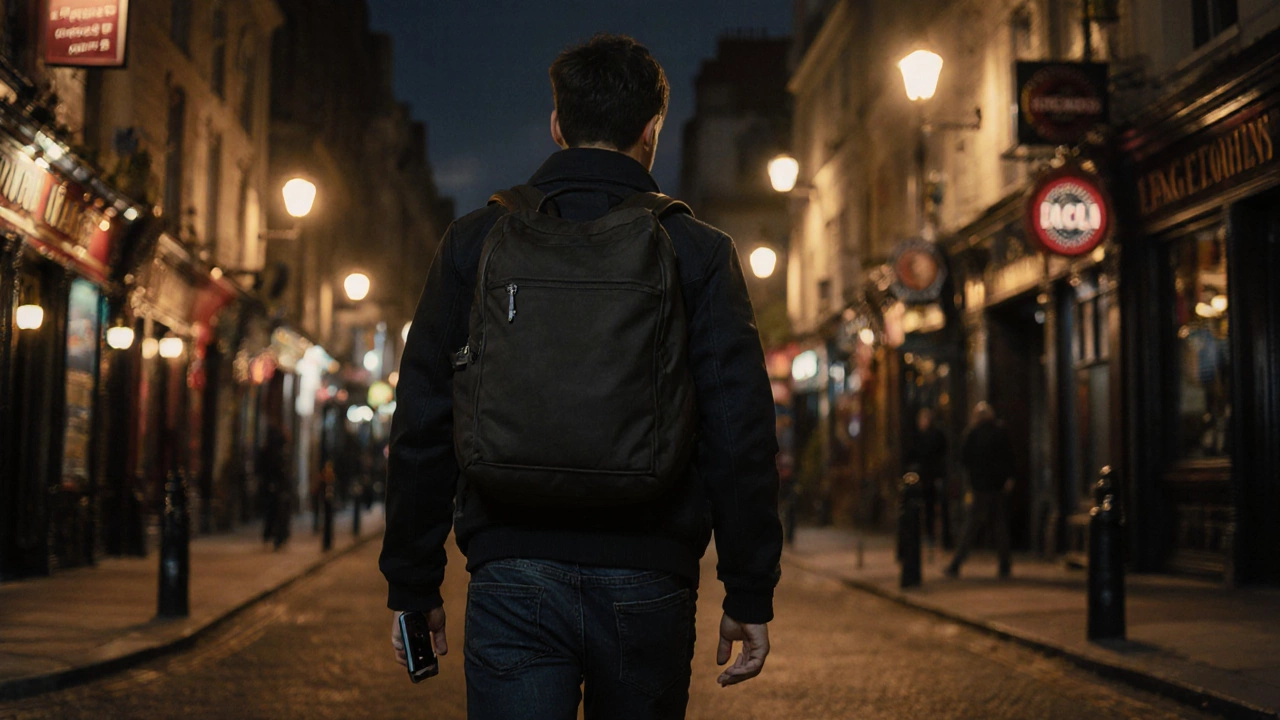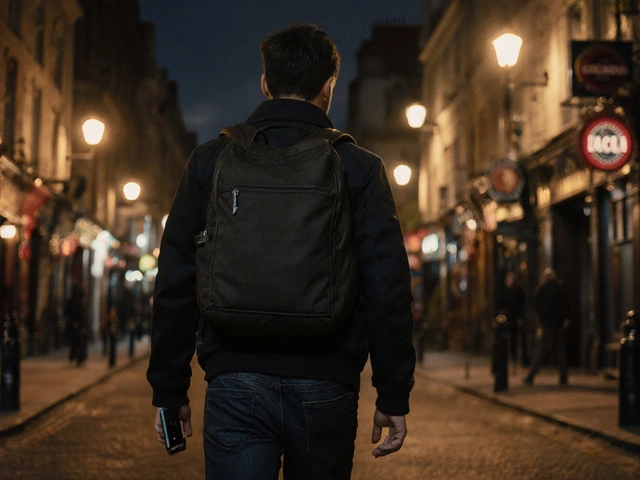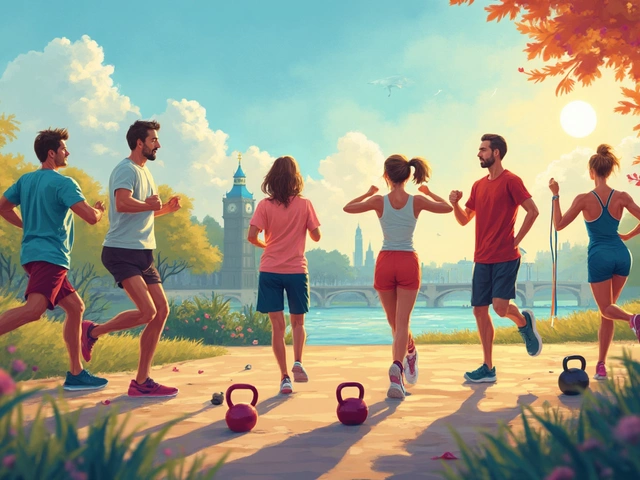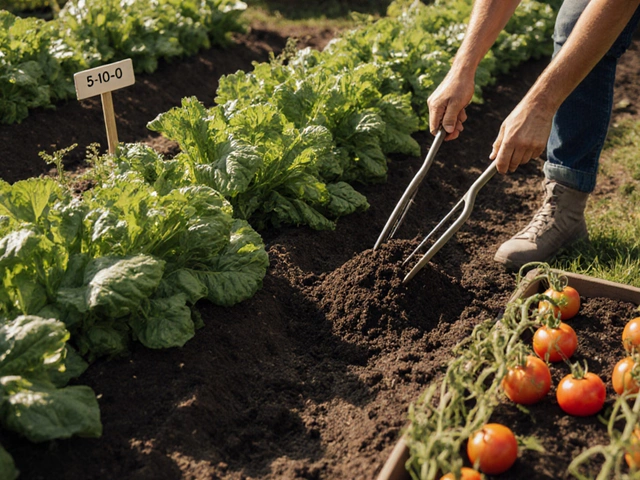UK Travel Safety Risk Calculator
Assess your personal safety risk in the UK based on your location, time of day, and behavior. This tool provides tailored safety tips to help you stay safe while traveling.
Every year, millions of visitors head to the UK for its history, culture, and vibrant cities. But if you’ve ever watched the news or scrolled through travel forums, you’ve probably seen stories about pickpockets in London, muggings in Manchester, or scams targeting tourists. The truth? Most of the UK is perfectly safe - but safety isn’t about luck. It’s about knowing where to look, what to avoid, and how to act like you belong.
Know which areas to be extra careful in
Not all parts of the UK are the same when it comes to crime. Big cities like London, Birmingham, and Manchester have higher rates of street crime than smaller towns. That doesn’t mean you can’t walk around them - it just means you need to be sharper.In London, areas like Camden, Tottenham, and parts of Peckham have higher incidents of theft and assault, especially after dark. Avoid walking alone through empty park paths or backstreets near train stations late at night. The same goes for parts of Manchester’s city center around Piccadilly Gardens after 11 p.m. These aren’t dangerous zones - they’re just places where thieves know tourists wander distracted.
On the flip side, cities like Bristol, Leeds, and Edinburgh have consistently lower crime rates for visitors. Even in busy spots like Edinburgh’s Royal Mile, crime is mostly opportunistic - not violent. Stick to well-lit streets, keep your phone in your pocket, and you’ll be fine.
Keep your valuables out of sight
Pickpockets in the UK don’t work like movie thieves. They don’t slash bags or shove you. They wait for you to be distracted - checking your phone, looking at a map, or taking a photo. That’s when they slide in.Here’s what actually works: don’t carry your passport, credit cards, and cash all together. Keep your passport in the hotel safe. Carry only what you need for the day - one card, £50 in cash, and your phone. Put your wallet in a front pocket. If you’re using a backpack, wear it in front of you on crowded trains or tourist spots. Tourists with backpacks on their backs are the #1 target in places like the London Underground or Oxford Street.
Phones are the biggest problem. If you’re walking while scrolling, you’re an easy mark. Use voice assistants to check directions. Put your phone away until you’re standing still. In 2024, over 68,000 phone thefts were reported in the UK - 40% of them happened to tourists.
Be smart with transportation
Public transport in the UK is efficient - and sometimes crowded. That’s when theft spikes. On the Tube in London, buses in Glasgow, or trains into Liverpool, keep your bag zipped and close. Don’t leave it on the seat beside you. If you’re traveling late at night, avoid empty carriages. Wait for a second train if needed. There’s safety in numbers.Never take unlicensed taxis. Always use Uber, Bolt, or official black cabs with visible license numbers. In cities like Birmingham and Bristol, fake taxi drivers have been known to overcharge or take tourists to sketchy areas. The app will show you the driver’s name, photo, and car details. If it doesn’t match - don’t get in.
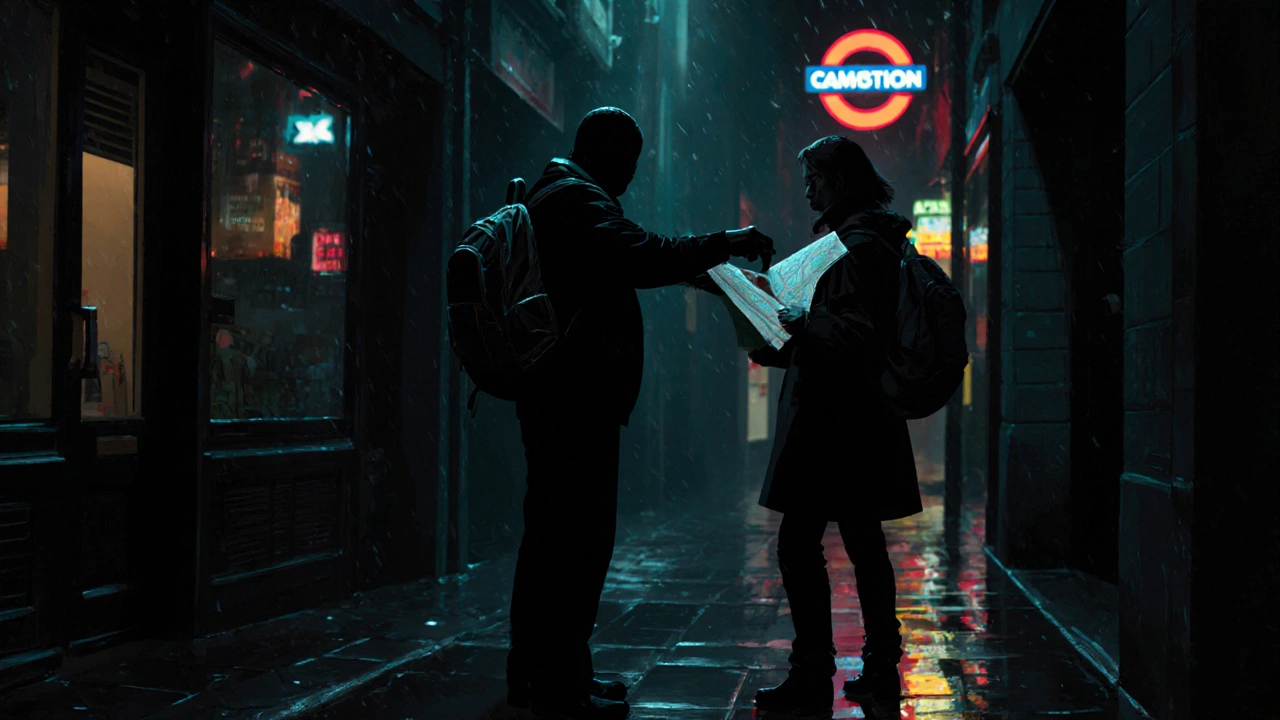
Watch out for common scams
Scammers in the UK aren’t always violent. Sometimes they’re just really good at pretending to be helpful.The “stranger offering help” scam is common. Someone approaches you, says they’re lost, and asks you to check their phone or help them find a hotel. While you’re distracted, their accomplice steals your bag. Or they’ll ask for directions - then suddenly pull out a fake lottery ticket or a “found” wallet and try to sell it to you. Walk away. Don’t engage.
Another one: fake police officers. They’ll say you’ve been flagged for a security check and ask to see your wallet or phone. Real UK police officers will never ask you to hand over your belongings on the street. They’ll ask you to go to a police station or wait for backup. If someone claims to be police and pressures you, say “I’ll wait for an officer in uniform” and step away.
Don’t fall for the “free gift” trick either. Someone hands you a cheap bracelet or sticker, then demands payment. Refuse. It’s a trick to make you look like you accepted something - then they claim you owe money.
Use tech to stay safe
Your phone isn’t just a distraction - it’s your best safety tool. Download the UK government’s SafeTravel app. It gives real-time alerts for crime hotspots in your area, based on police data. It’s free, works offline, and updates every hour.Turn on location sharing with someone you trust. Let them know where you’re going and when you expect to be back. If you’re walking alone at night, use the Apple Safety Check or Google’s Emergency Location Sharing. It sends your live location to a contact if you don’t check in after a set time.
Also, set up Find My iPhone or Android Device Manager. If your phone gets stolen, you can lock it remotely or erase your data. Don’t wait until it’s gone - set it up before you leave.
Blend in, don’t stand out
Tourists are easy to spot. You’re the one holding a giant map, wearing bright sneakers, and talking loudly on your phone. That makes you a target.Try dressing like locals. In London, dark jeans, a plain jacket, and walking shoes are normal. In Edinburgh, a waterproof coat is practical - not touristy. Avoid flashy jewelry, expensive watches, or branded bags. Carry a simple crossbody bag, not a touristy fanny pack.
Learn a few basic phrases. Saying “Excuse me” or “Thank you” in a British accent - even if it’s bad - makes people think you’re more local. It lowers your risk profile. Don’t walk around looking confused. If you’re lost, step into a café or shop and ask there. Staff are more likely to help than strangers on the street.
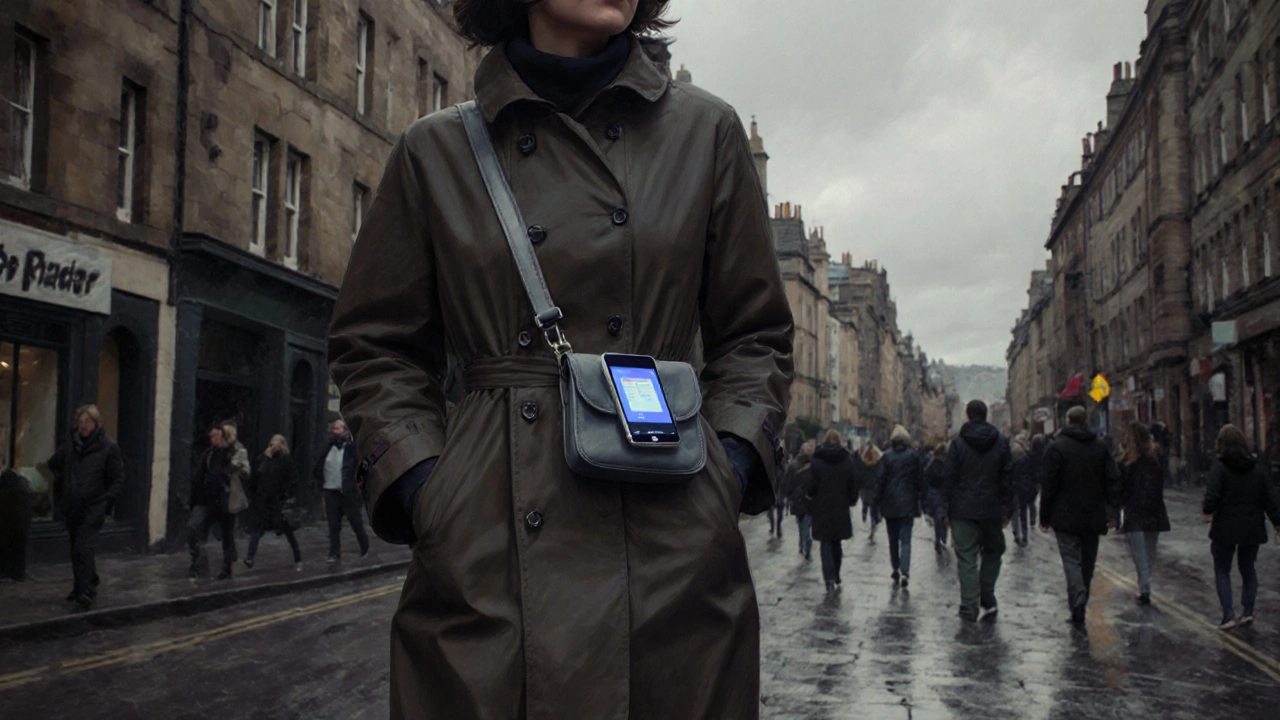
Trust your gut - and know where to go for help
If something feels off, it probably is. Don’t ignore that feeling. Cross the street. Go into a store. Call someone. You don’t need to explain yourself.UK police are approachable. If you feel unsafe, go into any police station, even if it’s not open. There’s always a button or intercom to call for help. You can also dial 999 for emergencies or 101 for non-urgent issues. Tourists can call for free, even without a UK SIM card.
For non-emergency help, visit the UK government’s travel advice page. It’s updated daily and includes warnings about specific areas, events, or scams.
What to do if you’re robbed
If you’re robbed, your first move isn’t panic - it’s documentation.1. Get to a safe place. Don’t chase the person. Your safety matters more than your stuff.
2. Call 101 (non-emergency) or 999 if you’re in immediate danger.
3. Write down everything you remember: what they looked like, what they took, where it happened, the time. Even small details help.
4. Contact your bank to block cards. Do this immediately - even if you think you’re not sure.
5. Report it to your embassy or consulate. They can help with emergency cash or replacing documents.
Most stolen items aren’t recovered. But reporting helps police track patterns and warn other travelers.
Bottom line: The UK is safe - if you’re smart
The UK isn’t a crime hotspot. Most visitors never have a bad experience. But crime happens to people who aren’t paying attention. You don’t need to live in fear. You just need to be aware.Keep your phone in your pocket. Don’t flash cash. Walk with purpose. Trust your instincts. Use the apps. Blend in. These aren’t paranoid habits - they’re simple habits of smart travelers.
People come to the UK for its pubs, museums, and countryside. Don’t let fear steal that from you. Just don’t make it easy for someone else to take it.
Is it safe to walk around London at night?
Yes, in most areas - but not everywhere. Central London neighborhoods like Covent Garden, Soho, and South Bank are well-lit and busy even late at night. Avoid isolated areas like Hackney Marshes, parts of Brixton, or unlit alleyways near train stations. Stick to main roads, use well-lit crossings, and don’t walk alone if you’re unfamiliar with the area. The safest option after dark is to take a licensed taxi or Uber.
Can I use my credit card in the UK?
Absolutely. Most places in the UK accept chip-and-PIN cards, including small shops and cafes. Contactless payments are the norm - you don’t need to hand over your card. Just tap and go. Always check your statement for unauthorized charges. If you’re worried, set up transaction alerts on your bank app. Avoid using ATMs in isolated areas - stick to those inside banks or major stores.
Are tourist areas more dangerous?
Yes - not because they’re violent, but because they’re crowded and full of distracted people. Places like Times Square in London (Covent Garden), the Edinburgh Royal Mile, and Manchester’s Northern Quarter are hotspots for pickpockets and scams. The higher the number of tourists, the higher the chance someone’s watching for an opportunity. Stay alert, keep valuables hidden, and don’t stop to take photos in the middle of busy sidewalks.
What should I do if I’m approached by someone asking for money?
Politely say “No, thank you” and keep walking. Don’t stop, don’t make eye contact for long, and don’t engage in conversation. Many of these people are part of organized scams - they’ll distract you while someone else steals your bag. In some cities, beggars are connected to criminal networks. Giving money doesn’t help - it encourages the behavior. If you want to help, donate to local charities instead.
Is public transport safe in the UK?
Generally, yes. The Tube, buses, and trains are monitored by CCTV and staffed during peak hours. But late at night, especially on weekends, crime rates go up. Avoid empty carriages. Sit near the driver or conductor. Keep your bag on your lap. If you feel uneasy, move to a different carriage or wait for the next train. Use the emergency button if needed - it connects directly to the driver.
Should I carry a copy of my passport?
Yes - but not the original. Keep your actual passport locked in your hotel safe. Carry a photocopy or a clear photo on your phone. If you’re asked for ID, most places accept a driver’s license or national ID card. Only show your passport if you’re at a police station or airport. Never hand it over to a stranger claiming to be police.
Are there any apps I should download before traveling to the UK?
Yes. Download the UK government’s SafeTravel app for real-time crime alerts. Also install Uber or Bolt for safe rides, Google Maps for offline navigation, and your bank’s app for transaction alerts. If you’re from the US or Canada, download the State Department or Global Affairs Canada app for emergency contacts. Keep your phone charged - carry a portable power bank.
What time of day is crime most common in the UK?
Most street crimes happen between 6 p.m. and midnight, especially on weekends. Pickpocketing peaks during rush hour on public transport (7-9 a.m. and 5-7 p.m.). Theft from parked cars spikes after dark in tourist-heavy areas. Avoid walking alone in quiet areas after 11 p.m. If you’re out late, stick to busy streets and use ride-share apps.
